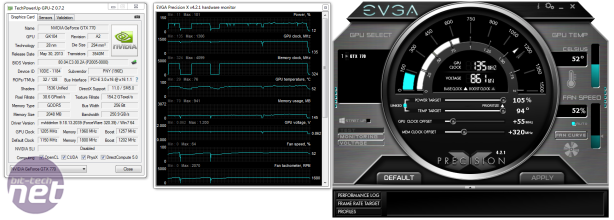
PNY GeForce GTX 770 XLR8 OC 2GB - Overclocking
As ever with board partner cards, factory overclocks are appreciated, but that won't stop us from seeing how much more a card has to give. With a huge heatsink for the GPU and mini ones for both the VRMs and memory modules, we were hopeful that PNY's GTX 770 XLR8 still had plenty of juice to be squeezed from it.Using EVGA's intuitive Precision X, we began by maxing out the card's power and temperature targets to give us the most headroom possible. Despite pushing the voltages up as well, we weren't able to add more than 55MHz onto the core clock. While this is only about 5 percent over PNY's own clock speeds, it's still a healthy 15 percent faster than a stock GTX 770 2GB. The boost clock increased to 1,257MHz at this setting, but peaked under load at a whopping 1,306MHz.
As for the memory, our gains were much more fruitful. At one point we were hopeful that the card would reach or break the 8GHz barrier, but sadly it wouldn't remain stable. We therefore settled on a memory clock of 1.96GHz (7.84GHz effective). This is still a crazy speed for graphics memory, and equates to a 9 percent gain over PNY's memory clock, or 12 percent compared to stock.

MSI MPG Velox 100R Chassis Review
October 14 2021 | 15:04









Want to comment? Please log in.